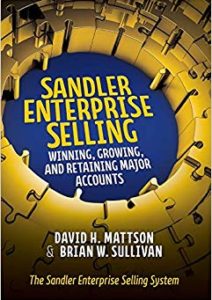In the complex world of enterprise selling, we focus keenly on team selling. In selling to and serving major accounts, team selling needs to be much more than just a tagline. It needs to be the way that you do business. In winning, growing and retaining large enterprise accounts, it’s an absolute survival skill.
But when we talk about team selling, we typically think about marshaling all the resources internal to a selling organization to be actively engaged in the selling process. Winning and growing major accounts, of course, should be everybody’s business. Accounting, finance, legal and all other functions must have a level of accountability and a role in making it happen. But there’s a broader element to team selling that looks beyond the walls of the selling organization. For the unique challenges of the enterprise world often require that team selling means the involvement of parties external to the organization as well. And while this collaboration can lead to big wins, the complexities of third-party partnering demand the navigation of very challenging waters.
Jay McBain, Forrester’s Principal Analyst of Global Channels reports that 75% of world trade now flows indirectly. Digest that for a moment and then think about the criticality of channel partners within that massive proportion of global business.
Of course, channels are involved in selling to small and medium-sized businesses as well, but the complicated needs and pains of large enterprise prospect accounts often dictate that channel partnering be mandatory to fortify both selling and delivery capabilities. As an example, I recently talked with a sales manager from a large technology infrastructure provider that won a $10 million deal with a top US-based health system that included nine partners providing supportive services in the winning solution. A big deal? For sure, but certainly not uncommon in the enterprise world. Consider also the US Department of Defense’s 10-year JEDI Cloud Contract, which recently went to RFP. It’s structured to be awarded to a single provider at an expected value of $10 billion! That’s billion with a “b”. You can be assured that likely bidders such as Amazon Web Services, Microsoft and IBM will come to the party with a powerful cast of characters of partners in their efforts to win and deliver such a mammoth contract.
We’ll focus here, though, not on partnering in delivery but specifically on the selling side of channel partnerships in which third-parties sell the products and services of the primary firm to actual end clients. These types of alliances involve the use of distributors, value-added resellers, franchisees, agents and other forms of third-parties to expand a firm’s reach, open new or hard-to-access markets and bridge connections between the firm’s offerings and potential buyers.
Such channel sales partnerships can provide powerful operational vehicles for increasing a firm’s bandwidth in executing its go-to-market strategy. With a dependable channel sales model in play, a firm can scale very effectively, ramping up or down as situations warrant, often utilizing multiple channel partners to achieve its goals. Such a strategy can also provide an economical selling framework, with expenses often much less than with direct sales forces. Of course, some degree of control is always sacrificed in channel models versus direct selling frameworks. And the increased levels of uncertainty and risk present negatives to be carefully considered in the cost-benefit analysis of channel models. Being forced to take into consideration not only the needs and pains of your prospects but those of indirect, often uncontrolled selling teams are simply not for the faint of heart.
In the enterprise selling world, having a keen understanding of channel partnerships and how they are executed is critical. Even if your firm sells directly without utilizing channels, you’ll most certainly be partnering with firms that do, putting you squarely in the channels world. And, of course, all firms face competitors that utilize third-party models and as such, thorough knowledge of the strengths and weaknesses of the channels model is vital. Such is the complex nature of enterprise selling – what you don’t know not only can hurt you but almost certainly will.
So, how can you develop a practical roadmap for the care and feeding of channel-based sales forces? Truthfully, it’s a topic that has not received the focus that you might expect it would deserve given Forrester’s 75% number. But I’ve been fortunate to know and to work closely with two experts who have authored a new and game-changing book – Making Channels Work: Ten Tools to Create a World-Class Third-Party Selling Program. Marcus Cauchi and David Davies have deep knowledge of the space and they provide a comprehensive, sales-focused perspective that will build your understanding and empower you with practical skills that can be implemented quickly. If your focus is enterprise selling or if you simply touch channels through managing, selling, partnering or competing, I strongly suggest that you read with this book. You will definitely win business as a result.












Comments